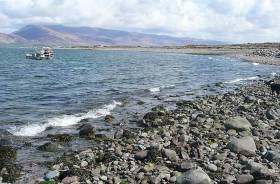Displaying items by tag: Cromane
Marine Minister Hails ‘Constructive Meetings’ on Visits to Fishing Ports in Co Kerry
Marine Minister Charlie McConalogue has continued his series of visits to some of Ireland’s main fishing ports, spending yesterday and today (Thursday 16 and Friday 17 September) in Co Kerry.
The minister met with fishers, fishing organisations and other stakeholders as he visited the ports of Dingle, Fenit and Cromane.
These visits follow on from the minister’s trips during the summer to Howth, Kilmore Quay, Dunmore East, Killybegs, Union Hall and Castletownbere.
In Fenit, the minister met with local fishers to discuss fishing matters. The Marine Institute and local stakeholders updated on conservation initiatives and measures for crayfish along the Co Kerry coastline and outlined protection measures for angel shark, skates and rays, particularly in the Tralee Bay area.
A public consultation on the crayfish fishery was launched last month to gather views on measures targeted at eliminating the by-catch of endangered species while seeking to secure a viable and sustainable future for the fishery. The consultation concluded yesterday.
Later the minister visited Dingle Fishery Harbour Centre and met the harbour master. Since 2010, €17.4 million has been invested in the development and maintenance of Dingle FHC under the Department of Agriculture, Food and the Marine’s Fishery Harbour and Coastal Infrastructure Capital Programme.
In Dingle, the minister also met with local fishers and representatives of the seafood and broader marine sector including the Dingle Innovation Hub and the Dingle Aquarium.
In Cromane, the minster met with, and heard the views of the local community regarding a landing facility.
Commenting on the visits, Minister McConalogue said: “I have had constructive meetings with fishers, aquaculture farmers and other stakeholders during my visit to Kerry today, and I thank everyone for meeting me to discuss matters important to their communities.
“It is a great opportunity for me to hear directly from marine stakeholders who are central in ensuring the long-term vibrancy of our coastal communities.”
Kayaker Drowns In Incident Off Kerry Coast
#Kerry - RTÉ News reports that a kayaker drowned off the Iveagh Peninsula in Co Kerry yesterday afternoon, Friday 10 August.
Emergency services were alerted around 2.30pm to Cromane after the kayaker had been recovered from the water by a local fisherman who attempted CPR, but the casualty was pronounced dead at the scene.
Search for Missing Kayaker to Continue in Kerry
#NEWS UPDATE - Breaking News reports that the search for a 38-year-old man who went kayaking near Cromane in Co Kerry in the early hours of yesterday will resume this morning.
The alarm was raised yesterday morning after the man - named locally as Nealie O'Connor, and the father of a two-month-old baby - failed to return from his lake kayaking trip.































































